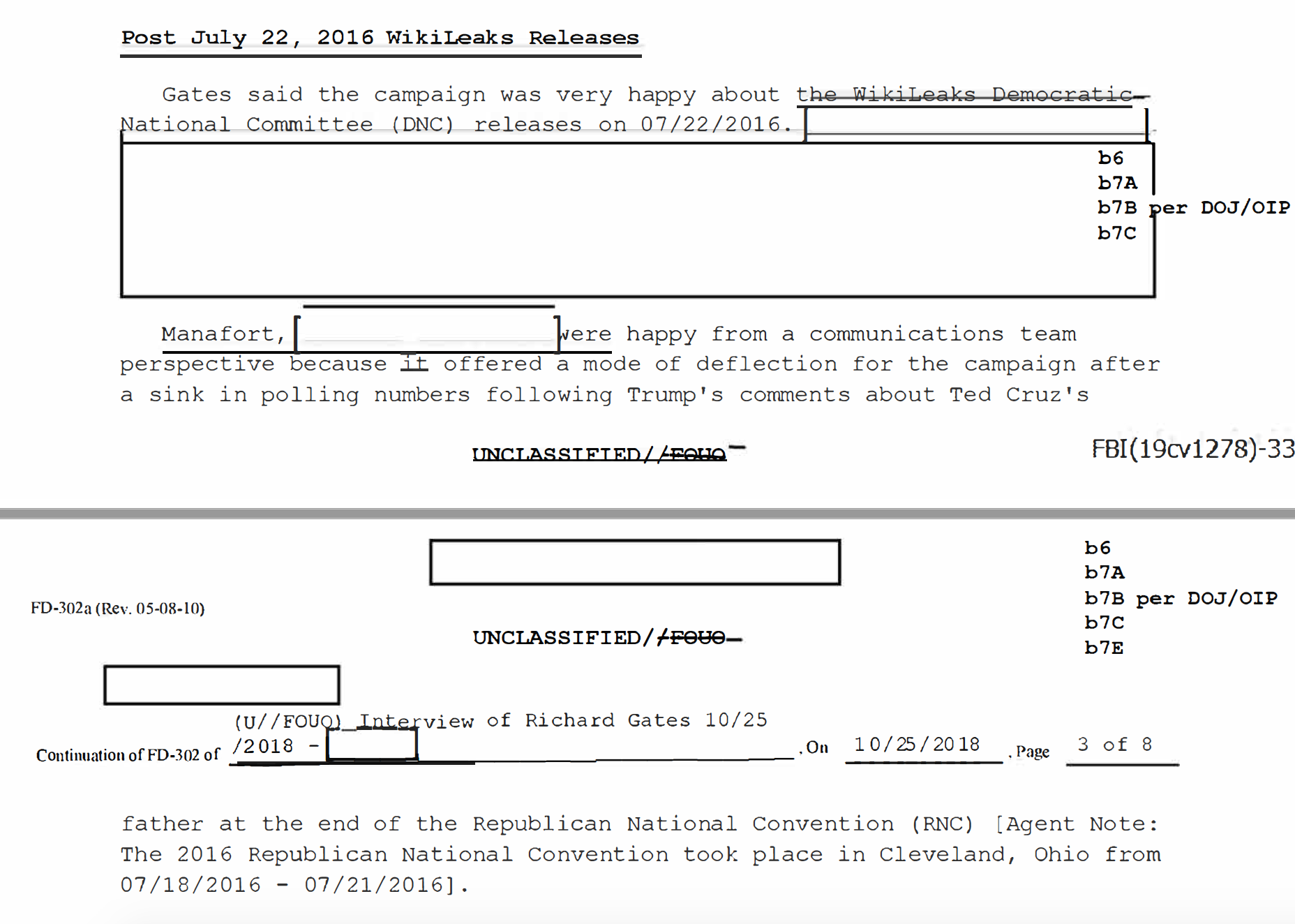
WASHINGTON — President Donald Trump’s team was “very happy” that WikiLeaks released emails hacked from the Democratic Party during the 2016 race, a former campaign official told investigators from the special counsel’s office.
Rick Gates, who served as Trump’s deputy campaign chair, told Robert Mueller’s team last year that the release of the hacked emails “offered a mode of deflection for the campaign after a sink in polling numbers following Trump's comments about Ted Cruz's father at the end of the Republican National Convention,” according to interview summaries obtained by BuzzFeed News.
Cruz, a senator from Texas, refused to endorse Trump at the convention. Afterward, Trump made a comment linking Cruz’s father to President John F. Kennedy’s killer.
Gates also told investigators that the Republican National Committee had “non-public information” about the timing of the WikiLeaks releases, but “did not specify who at the RNC knew this information.”
The RNC disputes this, saying it "had no advanced knowledge" of the releases. "Gates has already pled guilty to lying to federal authorities. Why would anyone believe him now?" Michael Ahrens, the RNC communications director, told BuzzFeed News on Saturday.
US intelligence agencies have concluded that Russian intelligence services were behind the hack of the Democratic National Committee and passed the information on to WikiLeaks, which the CIA has labeled a “non-state hostile intelligence service.”
Julian Assange, the WikiLeaks founder, announced in June 2016 that the group had an upcoming email leak related to Hillary Clinton, whose use of a private email server while secretary of state was under federal investigation at the time and who had previously deleted thousands of emails she deemed personal. But Gates, who spoke to Mueller’s team several times after agreeing to cooperate with the investigation, said the Trump campaign’s “interest in the emails was ratcheting up” before Assange’s announcement — in April and May — “because it was likely the emails could help Trump's campaign.”
Several members of the Trump campaign — including Paul Manafort, Michael Flynn, Jared Kushner, Corey Lewandowski, Jeff Sessions, and Sam Clovis — had “expressed interest” in finding emails belonging to Hillary Clinton, according to Gates. “Gates said Donald Trump Jr. would ask where the emails were in family meetings.” As for the now-president, “Gates said Trump was interested in the emails but remained composed with a healthy skepticism.”
Meanwhile, the RNC “was energized by Assange's announcement,” Gates said, adding that he knew “the RNC was going to run the WikiLeaks issue to ground.”
“Trump and Kushner were initially skeptical about cooperating with the RNC, but the WikiLeaks issue was a turning point,” Gates told investigators.
Manafort had instructed Gates to “periodically call” someone whose name is redacted from the documents “to check in on where the information was and when it would be coming,” Gates told investigators. He also “recalled a conversation” with someone before the leak in which that person told him that WikiLeaks would be releasing information.
“Gates said a messaging strategy was being built in the June/July 2016 timeframe surrounding the upcoming release of information,” the interview summary reads. “[Redacted] was building this strategy with Manafort also involved.”
Gates also told investigators that “Trump was generally frustrated Clinton's missing emails had not been found.”

At one point — it isn’t clear exactly when from the redacted documents — Trump said “get the emails” while on his campaign plane, Gates said. Flynn, the former head of the Defense Intelligence Agency, “said he could use his intelligence sources to obtain the emails” and “was adamant the Russians did not carry out the hack.”
The documents also state: “Gates said Flynn had the most Russia contacts of anyone on the campaign and was in the best position to ask for the emails if they were out there.”
Once WikiLeaks began releasing the emails, Manafort and another person whose name is redacted “were happy from a communications team perspective” because it provided an opportunity to deflect from Trump’s attacks on Cruz. “Trump was advised not to react to the releases and let it play out,” Gates told investigators.
In a phone call after the release, “Gates gathered that [...] there would be additional leaks coming. Gates thought this because shortly after boarding the plane Trump stated that more leaks were coming.”

Manafort, who was “getting pressure regarding [redacted] information,” apparently continued to instruct Gates to obtain “status updates on upcoming information.”
Among the hacked emails were many belonging to John Podesta, the chair of the Clinton campaign. Gates told investigators that “there was a strategy to defend Manafort by attacking Podesta,” with the idea being that “Podesta had baggage as well.”
Gates cooperated with investigators after pleading guilty to charges brought by the special counsel's team, while Manafort is now serving a seven-year sentence behind bars.

